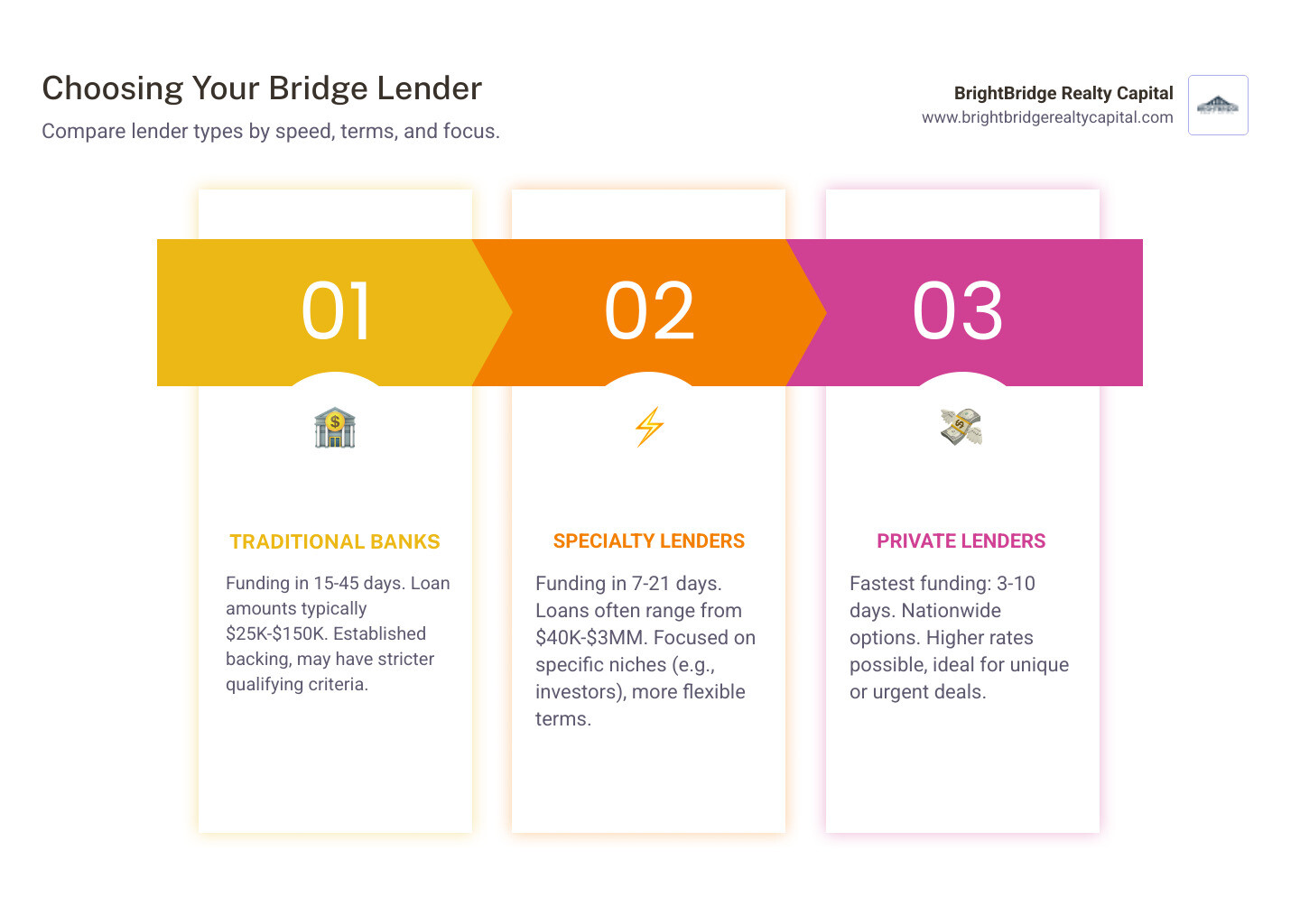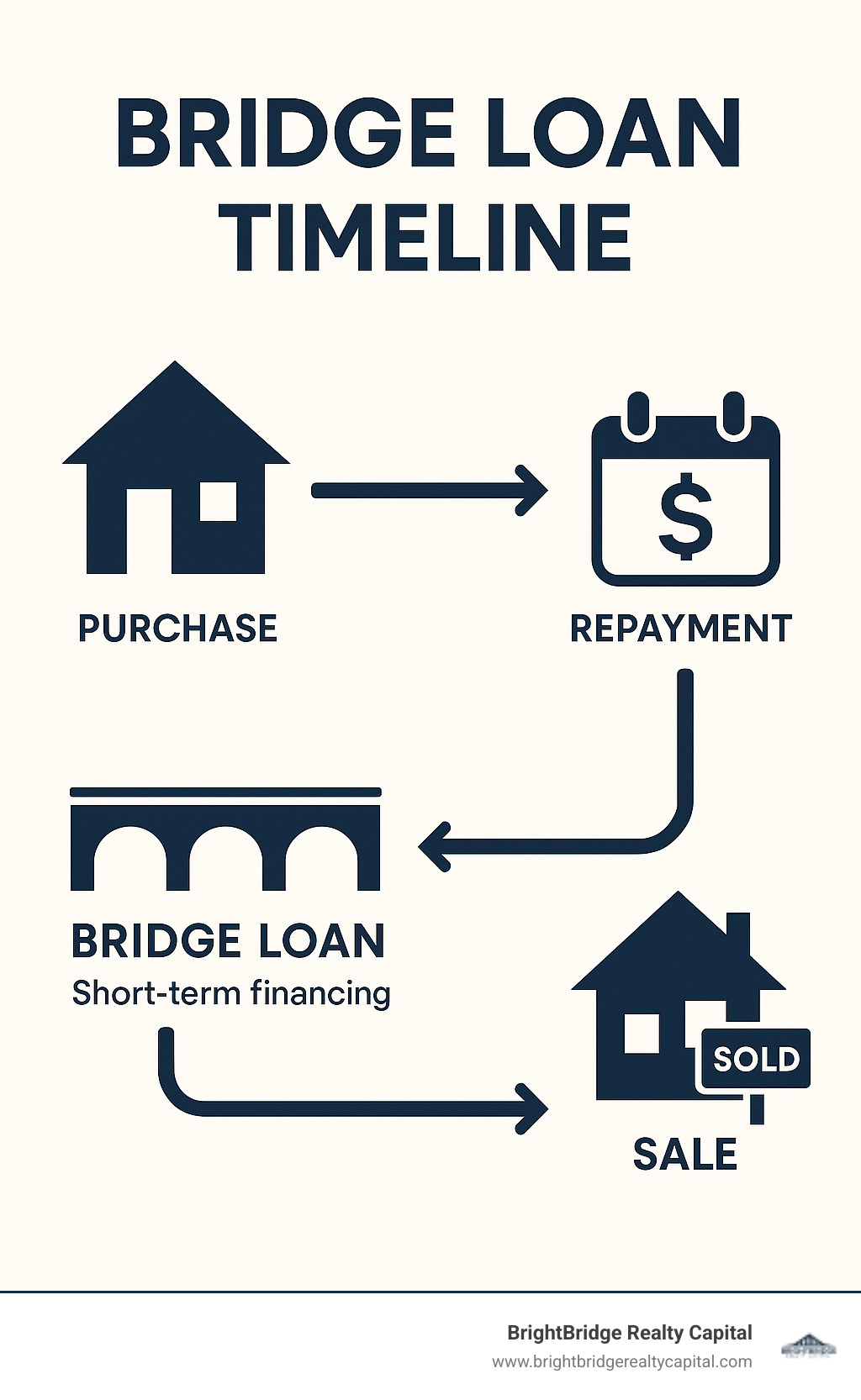Find Your Perfect Bridge: A Roundup of Top Lenders

Why Bridge Loan Lenders Matter for Real Estate Success
In today's dynamic and often volatile real estate market, speed is not just an advantage; it's a necessity. Companies that offer bridge loans provide this critical element, delivering fast, flexible financing that empowers real estate investors and homebuyers to capitalize on time-sensitive opportunities. Whether you're looking to buy a new home before selling your current one, fund a lucrative fix-and-flip project, acquire a commercial property at auction, or expand your rental portfolio, the right financing partner can be the deciding factor between securing a great deal and watching it slip away.
Bridge loans are short-term financing solutions designed to bridge a temporary cash flow gap. They typically range from as little as $25,000 for minor projects to well over $2 million for significant commercial acquisitions, with terms generally lasting between 6 and 24 months. While interest rates, often running at Prime + 2-3% or higher, and origination fees of 1-2.5% are more substantial than traditional mortgages, their value lies in their speed. Most specialized lenders can close a deal in 5-30 days, a stark contrast to the 45-60 day timeline of conventional bank loans.
This speed is paramount. The key is to find a lender whose services align perfectly with your specific scenario. Some lenders specialize in residential moves for homeowners, while others focus exclusively on the complex needs of seasoned real estate investors. Some offer nationwide coverage, while others leverage deep knowledge of specific regional markets. The differences in speed, cost, loan flexibility, and underwriting criteria vary significantly between providers, making your choice of lender a strategic decision.
I'm Daniel Lopez, a senior loan officer at BrightBridge Realty Capital. My role involves helping investors and property owners navigate complex financing structures and select the ideal bridge loan providers for their unique projects. Through years of experience working directly with a wide array of companies that offer bridge loans, I've gained firsthand insight into how the right lending partner can not only accelerate a deal but also fundamentally enhance investment returns and reduce transactional friction.

Companies that offer bridge loans terms to know:
What is a Bridge Loan and How Does It Work?
A bridge loan is a form of temporary, short-term financing designed to "bridge the gap" between two related financial transactions. It is almost always a secured loan, with real estate being the most common form of collateral. The primary purpose of a bridge loan is to provide immediate liquidity, prioritizing speed and flexibility over the lower costs associated with long-term, conventional financing.
Consider the classic residential scenario: you've found your dream home, but the closing date is weeks before your current home is set to sell. In a competitive market, you can't make your offer contingent on the sale of your home. This is where a bridge loan comes in. It provides the necessary funds for the down payment and purchase of your new home by leveraging the equity you've built in your existing property. Once your old home sells, the proceeds are used to pay off the bridge loan, and you transition to your permanent mortgage on the new property. This simple mechanism removes immense stress and uncertainty from the home-buying process.

Beyond residential moves, real estate investors and business owners use bridge loans to seize a variety of time-sensitive opportunities:
- Buying Before Selling: As described above, this allows a homebuyer to acquire a new property without being forced to sell their existing one first, making their purchase offer as strong as a cash offer.
- Property Renovations and Fix-and-Flips: An investor might use a bridge loan to purchase a distressed property and fund the immediate renovations. For example, an investor buys a property for $300,000 with a planned renovation budget of $50,000. A bridge loan can cover a significant portion of both the purchase price and the rehab costs. After the renovations are complete and the property's value increases to $450,000, the investor sells it, repays the bridge loan, and pockets the profit.
- Preventing Foreclosure: A property owner facing foreclosure can use a fast-funding bridge loan to pay off the outstanding debt to their current lender. This stops the foreclosure process and provides them with a crucial window of 6-12 months to sell the property on their own terms or secure long-term refinancing, thus preserving their equity.
- Commercial Property Acquisition and Stabilization: An investor may want to acquire a commercial building with a high vacancy rate. Traditional banks are hesitant to finance such properties. A bridge loan can fund the acquisition and provide capital for improvements and marketing to attract tenants. Once the property is "stabilized" (i.e., has a high occupancy rate and steady cash flow), the investor can refinance with a conventional commercial mortgage at a much lower rate.
The core mechanism behind this speed is the lender's focus on collateral. Companies that offer bridge loans are primarily concerned with the value of the real estate securing the loan. They use this asset as the basis for their lending decision, which allows for quicker funding with significantly less paperwork and income verification compared to traditional mortgages. The loan amount is calculated based on the equity in the collateral property, minus any existing mortgages and estimated closing costs, ensuring the lender is in a secure position.

The Pros, Cons, and Key Features of Bridge Financing
Bridge loans are a powerful financial tool, but they are not a one-size-fits-all solution. A thorough understanding of their distinct advantages, significant drawbacks, and key features is essential for any borrower to determine if this type of financing aligns with their real estate goals and risk tolerance.
Advantages: Why Consider a Bridge Loan?
The primary allure of a bridge loan lies in its unparalleled speed and strategic flexibility, which translate into several tangible benefits.
- Making Non-Contingent Offers: In a seller's market, offers contingent on the sale of the buyer's current home are often dismissed. A bridge loan provides the funds to make a clean, non-contingent offer, which is nearly as attractive to a seller as an all-cash deal. This dramatically strengthens your negotiating position and increases the likelihood of your offer being accepted.
- Securing a Home in a Competitive Market: When desirable properties receive multiple offers and sell within days, the ability to act decisively is crucial. A bridge loan allows you to bypass the lengthy process of a traditional mortgage, enabling you to secure your new property before another buyer does.
- Avoiding Double Moves and Temporary Housing: The logistics of selling one home and buying another can be a nightmare. A bridge loan allows you to purchase and move into your new home on your own schedule, before selling your old one. This eliminates the need for costly temporary housing and the hassle of moving twice.
- Funding for Pre-Sale Renovations: A bridge loan can unlock capital to make strategic renovations to your current property before listing it for sale. This can significantly increase its market value and sale price, maximizing your return on investment. This is especially useful for fix-and-flip investors who need to fund both acquisition and rehab.
- Flexibility for Unique Borrower Situations: Private bridge loan lenders are often more flexible than traditional banks. They can accommodate borrowers with strong assets but non-traditional income streams, such as self-employed individuals or 1099 earners, who may struggle to meet the strict documentation requirements of conventional loans.
Disadvantages: What Are the Potential Risks?
Borrowers must be acutely aware of the potential downsides and costs before committing to a bridge loan.
- Higher Interest Rates: This is the most significant trade-off. As short-term, higher-risk products, bridge loans carry interest rates that are substantially higher than conventional mortgages. For investor loans, rates typically range from 7.5% to 11.5% or even higher, depending on the lender and the deal's risk profile. This is the price paid for speed and convenience.
- Significant Origination and Closing Fees: Lenders charge upfront origination fees, typically ranging from 1% to 2.5% of the total loan amount. In addition to this, borrowers must cover other closing costs, such as appraisal fees, title insurance, escrow fees, and legal fees, which can add up quickly.
- Administrative and Processing Fees: Expect to pay flat administration or underwriting fees, usually between $200 and $1,500, to cover the lender's cost of processing and managing the loan file. For larger or more complex loans, lenders might register a lien on your property, which requires additional legal fees.
- Managing Two Housing Payments: During the bridge loan term, you may be responsible for three payments simultaneously: your existing mortgage, the new bridge loan payment (often interest-only), and the mortgage on your new home. This requires careful and conservative financial planning to ensure you can manage the cash flow strain.
- Severe Default Risk if Property Sale Fails: This is the single greatest risk. A bridge loan is predicated on a successful exit strategy—typically the sale of your existing property. If that property fails to sell within the loan's term (e.g., 6-12 months), you are in default. The consequences can be severe: the lender may charge a much higher penalty interest rate, demand hefty extension fees, or, in the worst-case scenario, initiate foreclosure proceedings to seize and sell your collateral property to repay the debt. A clear, realistic, and viable exit strategy is not just important; it's absolutely essential.
Types of bridge loan providers
The landscape of companies that offer bridge loans is diverse, ranging from large, conservative institutions to nimble, specialized private firms.

- Traditional Banks: Large national and regional banks sometimes offer bridge loans, but usually only to existing, high-net-worth customers with impeccable credit and strong financials. Their processes are notoriously slow and their underwriting criteria are the strictest, but they may offer the lowest rates to their prime clients.
- Mortgage Lenders: Many companies that specialize in residential mortgages also provide bridge loan programs. They often have a broader geographic reach and more streamlined processes than traditional banks but still maintain a strong preference for borrowers with high credit scores and verifiable W-2 income.
- Private Lenders / Specialty Real Estate Finance Companies: This is the category where BrightBridge Realty Capital operates. These lenders, also known as hard money lenders, specialize in rapid, flexible, asset-based financing for real estate investors and complex transactions. They focus more on the property's equity and the deal's viability than on the borrower's personal financial statement.
- Differences in Speed: This is their primary advantage. While a bank might take 45-60 days to fund a loan, a private lender can often close in 5-10 business days, a critical factor for competitive real estate deals.
- Differences in Cost: This speed and flexibility come at a price. Private lenders' rates and fees are typically higher than those of banks. However, for an investor, the profit gained from securing a time-sensitive opportunity often far outweighs the higher financing cost.
- Differences in Criteria: Private lenders have much more flexible underwriting standards. They are willing to lend to borrowers with lower credit scores, non-traditional income, or complex entity structures, as long as there is sufficient equity in the collateral and a clear, plausible exit strategy.
Understanding the Numbers: Bridge Loan Costs, Terms, and Qualifications
Before you apply for a bridge loan, it is imperative to have a granular understanding of the associated costs, typical terms, and strict qualification requirements. Going in with clear eyes will help you budget effectively and determine if this is the right financial product for your situation.
Typical Costs and Repayment Structures
The total cost of a bridge loan extends far beyond the advertised interest rate. A comprehensive assessment includes several key components.
- Interest Rates: As short-term, risk-oriented loans, bridge loan rates are significantly higher than conventional 30-year mortgages. They typically range from 7.5% to 11.5% for residential scenarios and can be higher for investment properties, reflecting the lender's risk and the need for a quick return.
- Origination and Other Fees: This is a major cost center. Expect an upfront origination fee, which is the lender's charge for creating the loan, calculated as a percentage of the loan amount (typically 1% to 2.5%). Beyond that, you'll encounter a host of other third-party and lender fees:
- Appraisal Fee: To verify the value of the collateral property ($500 - $1,500+).
- Title and Escrow Fees: To ensure the property title is clear and to manage the closing process ($1,000 - $3,000+).
- Underwriting/Administrative Fees: The lender's internal cost for processing your file ($500 - $1,500).
- Legal Fees: For document preparation and review, especially for commercial or entity borrowers.
- Loan Terms: Bridge loan terms are, by definition, short. They usually range from 6 to 18 months. For more complex commercial or new construction projects, terms can sometimes extend up to two or three years, often with specific performance milestones attached.
- Repayment Structure: The vast majority of bridge loans are structured with interest-only monthly payments. This keeps the monthly carrying cost lower than a fully amortizing loan. However, the entire original principal amount is due as a single, large balloon payment at the end of the loan term. This lump-sum repayment is typically funded by the proceeds from the sale of the collateral property or through a refinance into a long-term mortgage.
To give you a clearer picture, let's compare typical costs for bridge loans with other short-term real estate financing options that we offer at BrightBridge Realty Capital:
| Feature | Bridge Loans (General) | Hard Money Loans (BrightBridge) | Fix-and-Flip Loans (BrightBridge) | Ground-Up Construction Loans (BrightBridge) |
|---|---|---|---|---|
| Typical Term | 6-18 months | 6-24 months | 12-24 months | 12-36 months |
| Interest Rate | 7.5% - 11.5% | 8% - 14% | 8% - 12% | 9% - 14% |
| Origination Fee | 1% - 2.5% | 2% - 5% | 2% - 4% | 2% - 5% |
| LTV / LTC | Up to 80-89.99% | Up to 75% LTV | Up to 90% LTC (Purchase + Rehab) | Up to 85% LTC |
| Primary Use | Bridge timing gaps | Quick capital for distressed assets | Acquire, rehab, sell | New construction projects |
| Repayment | Interest-only, balloon | Interest-only, balloon | Interest-only, balloon | Interest-only, balloon |
Who is eligible for a bridge loan?
Qualification criteria vary by lender, but companies that offer bridge loans, especially private lenders, focus heavily on the quality of the collateral and the borrower's ability to execute the repayment plan.
- Strong Property Equity: This is the single most critical factor. Lenders need to see significant equity in the property being used as collateral. They assess this using Loan-to-Value (LTV). For example, if your home is worth $500,000 and you have an existing mortgage of $200,000, you have $300,000 in equity. A lender might offer a bridge loan up to 80% LTV, or $400,000 total financing. Your new bridge loan would be for $200,000 ($400,000 total LTV - $200,000 existing mortgage).
- Good Credit Score: While private lenders are more flexible than banks, a good credit score (typically 680+) will always improve your chances of approval and help you secure better terms and a lower interest rate. A poor credit score may not be a deal-breaker if the equity is very high, but it will result in higher costs.
- Verifiable Income/Assets: You must demonstrate the ability to handle the monthly interest-only payments, plus your other existing obligations. Some lenders offer flexible programs for those with non-traditional income, like 1099 earners, by looking at bank statements instead of tax returns.
- A Clear and Viable Exit Strategy: This is non-negotiable. Lenders must be convinced you have a solid plan for repaying the balloon payment. A strong exit strategy is a signed sales contract on your departing residence. A weaker, but still viable, strategy might be a listing agreement with a top real estate agent in a hot market. For investors, the exit is typically a planned sale to a third party or a refinance into a long-term loan, such as one of our DSCR loans for investors, which is supported by a detailed project plan and market analysis.
How to Choose from Companies That Offer Bridge Loans
Selecting the right lending partner is as crucial as securing the loan itself. The wrong choice can lead to costly delays, unexpected fees, and a failed transaction. A methodical approach to vetting potential lenders is essential.
Factors to Consider When Choosing a Lender
When evaluating companies that offer bridge loans, you must look beyond the headline interest rate and dig into the operational details that define a great lender.
- Speed of Closing: How quickly can the lender reliably take you from application to funded loan? In a time-sensitive situation, this is often the most important factor. Ask for their average closing time and if they can provide a funding guarantee. At BrightBridge Realty Capital, we pride ourselves on our ability to close deals in as little as one week.
- Fee Transparency and Structure: A reputable lender will provide a clear, itemized, and upfront breakdown of all fees. Beware of lenders who are vague about costs or have complex fee structures. You should receive a term sheet early in the process that outlines every single cost you will incur.
- Loan Flexibility and Customization: Real estate deals are rarely straightforward. Does the lender offer terms that can be customized to your situation? This could include options for interest reserves (where payments are built into the loan), flexible draw schedules for renovation funds, or clear, reasonable options for a loan extension if your property sale is unexpectedly delayed.
- Lender Specialization and Expertise: Choose a lender that lives and breathes your type of project. A lender specializing in residential bridge loans for homeowners will have a different skill set than one focused on commercial properties or fix-and-flip projects for investors. An experienced investor-focused lender will better understand rehab budgets, after-repair values (ARV), and the pace of investment real estate.
- Customer Service and Communication: Is the lender responsive? Do you have a single point of contact? Good communication and direct access to decision-makers can make a complex and stressful process much smoother. A lender who disappears after you've submitted your application is a major red flag.
- Reputation and Track Record: Research the lender's history. Look for online reviews, testimonials, and case studies of deals similar to yours. A long track record of successful closings is a strong indicator of reliability.

Comparing Provider Types for Your Scenario
Your specific needs should dictate your choice of provider.
- Direct Lenders: For maximum speed and flexibility, a direct lender like BrightBridge Realty Capital is often the best choice for investors and complex situations. As a direct lender, we use our own capital and have in-house underwriting, which means we make the decisions. This cuts out intermediaries, leading to faster decisions, more flexible terms, and clearer communication.
- Brokers: A loan broker can connect you with multiple lenders, which can be helpful if you're unsure where to start. However, this can add another layer to the process, potentially slowing things down and adding cost, as the broker will also need to be compensated.
- Speed vs. Cost Analysis: This is the fundamental trade-off. A traditional bank may offer a bridge loan at 8%, while a private lender offers one at 10%. The bank, however, will take 45 days, while the private lender can close in 7 days. If that speed allows you to purchase a property for $40,000 under market value that you would have otherwise lost, paying the extra 2% in interest for a short period is a highly profitable business decision.
- Investor-Focused Lending: If you are a real estate investor, it is critical to seek out lenders with a deep track record in financing investment properties. They speak your language and understand your business model. Our fix-and-flip financing is a product designed by investors, for investors, with this principle in mind.
What to ask companies that offer bridge loans
Before committing to any lender, arm yourself with these critical questions:
- What is the total estimated loan cost, including all origination, administrative, and third-party fees? Can I see an itemized term sheet?
- What is the exact loan term, and what are the specific costs and conditions for an extension if my property sale is delayed?
- What is the full repayment schedule, and when exactly is the final balloon payment due?
- What are the penalties for late payments or default?
- Are there any prepayment penalties if I sell my property and pay off the loan early?
- What specific collateral is required, and what is the maximum Loan-to-Value (LTV) you will offer?
- What is your realistic, typical funding timeline from application to closing?
- Who will be my single point of contact throughout the entire process?
- Are there any geographic limitations or preferences for your lending? (While we lend nationwide, we prefer major metropolitan areas.)
Frequently Asked Questions
Here are detailed answers to some of the most common questions borrowers have about bridge loans and the companies that offer them.
How are residential and commercial bridge loans different?
While both serve to bridge a financial gap, residential and commercial bridge loans are fundamentally different products tailored to different borrowers and purposes.
- Purpose and Borrower: Residential bridge loans are for individuals or families purchasing a new primary residence before selling their old one. Commercial bridge loans are for business entities and investors acquiring or repositioning income-producing properties (e.g., apartment buildings, office spaces, retail centers).
- Underwriting Focus: Underwriting for a residential loan centers on the individual's personal credit score, income (often W-2), and debt-to-income ratio. For a commercial loan, the lender's focus is primarily on the property's economic potential—its current and projected cash flow, tenant quality, market position, and the borrower's experience as a real estate investor.
- Complexity and Scale: Commercial loans are typically larger and structurally more complex. They may involve multiple properties, construction components, and more extensive due diligence, including environmental reports and detailed lease analysis. Terms for commercial bridge loans can also be longer (2-3 years) to allow time for property stabilization.
- Lender Specialization: Most companies that offer bridge loans specialize in either residential or commercial lending. It is rare to find a lender that excels at both, as the required skill sets and risk analysis models are very different.
What are the main alternatives to a bridge loan?
While bridge loans are excellent for specific scenarios, other financing options might be more suitable depending on your timeline, cost sensitivity, and needs.
- Hard Money Loans: Often used interchangeably with private bridge loans, these are asset-based loans ideal for properties that don't qualify for traditional financing, such as distressed assets needing significant renovation. They are very fast but typically have the highest rates and fees. We offer hard money loans for investors needing maximum speed and flexibility.
- Home Equity Line of Credit (HELOC): A HELOC allows you to borrow against the equity in your current home, providing a revolving line of credit. It is generally much cheaper than a bridge loan but the application and approval process is much slower, often taking 30-45 days, making it unsuitable for time-sensitive purchases.
- Personal Loan: For smaller funding gaps, an unsecured personal loan might be an option. However, loan amounts are typically limited (e.g., under $50,000), and interest rates are very high since there is no collateral.
- Seller Financing: In rare cases, the property seller may be willing to provide financing for the buyer, acting as the bank. This can be highly flexible but depends entirely on the seller's financial position and willingness.
- Cash-Out Refinance: This involves refinancing your existing mortgage for a higher amount than you currently owe and taking the difference in cash. This is a long-term solution that replaces your current mortgage and is not ideal for short-term needs due to a lengthy closing process (45-60 days).
Can a bridge loan be used for new construction?
Yes, bridge loans are a common and effective tool for funding new construction projects, particularly in the early and transitional phases.
- Land Acquisition and Initial Funding: A developer might use a bridge loan to quickly acquire a parcel of land and cover initial pre-development costs (e.g., architectural plans, permits) while they work to secure a larger, traditional construction loan, which can take many months to approve.
- Bridging to Long-Term Financing: After a construction project is complete, the property is often vacant. It is not yet "stabilized" and generating income, making it difficult to qualify for a permanent mortgage. A bridge loan can be used to pay off the initial construction loan and "bridge" the gap during the lease-up phase. Once the building is fully leased and generating steady cash flow, the developer can easily refinance into a more favorable long-term loan. Our ground-up construction loans are specifically designed to support developers through this entire lifecycle.
Can I get a bridge loan with a low credit score?
Yes, it is often possible. This is a key differentiator for private and hard money lenders compared to traditional banks. While a bank will likely deny an applicant with a credit score below 680, a private lender focuses more on the asset. If you have significant equity in your property (e.g., a low loan-to-value ratio of 65% or less) and a clear exit strategy, many private lenders will approve the loan. However, you must expect to pay for this flexibility with a higher interest rate and potentially higher origination fees. The lender is taking on more perceived risk and will price the loan accordingly.
What documents are typically required for a bridge loan application?
While private lenders require less paperwork than banks, you will still need to provide a core set of documents to verify your identity, the property, and the transaction. Be prepared to submit:
- A completed loan application
- A copy of a government-issued photo ID
- The fully executed purchase agreement for the new property
- The listing agreement or sales contract for the property being sold
- Recent mortgage statements for all properties owned
- Recent bank statements to show liquidity
- For investors, formation documents for your LLC or corporation (e.g., operating agreement, articles of organization)
Conclusion: Secure Your Next Property with Confidence
In the high-stakes world of real estate, timing is everything. Bridge loans serve as a powerful strategic tool, providing the critical liquidity and speed necessary to navigate complex transactions and capitalize on fleeting opportunities. They empower homeowners to transition smoothly between residences without the stress of contingencies and enable investors to act with the decisiveness required to build a successful portfolio.
However, the power of a bridge loan is only realized when paired with the right lending partner. The market for companies that offer bridge loans is diverse, and the choice you make will have a significant impact on your deal's success. As we've explored, the key is to look beyond headline rates and conduct a thorough evaluation of a lender's speed, transparency, flexibility, and expertise. A cheap loan that closes too late is worthless. For real estate investors, in particular, the ability to act swiftly is often the primary driver of profitability, making the right private lender an invaluable ally.
At BrightBridge Realty Capital, we are built on the principle of speed and certainty. We understand the urgency that defines the modern real estate industry because we are investors ourselves. Based in New York, NY, and lending nationwide, we specialize in providing customized financing solutions for investors who require quick, flexible, and reliable funding. Our unique selling proposition is our commitment to fast closings, often within a single week, facilitated by our status as a direct lender with an in-house underwriting team. We eliminate the brokers and bureaucracy to give you a direct path to the capital you need, when you need it most.
Don't let a financing gap or a slow lender stand in the way of your next great investment. It's time to partner with a lender who moves at the speed of your ambition. We're here to help you find your perfect bridge. Explore our stabilized bridge loan options to fund your next investment and experience the BrightBridge difference.


